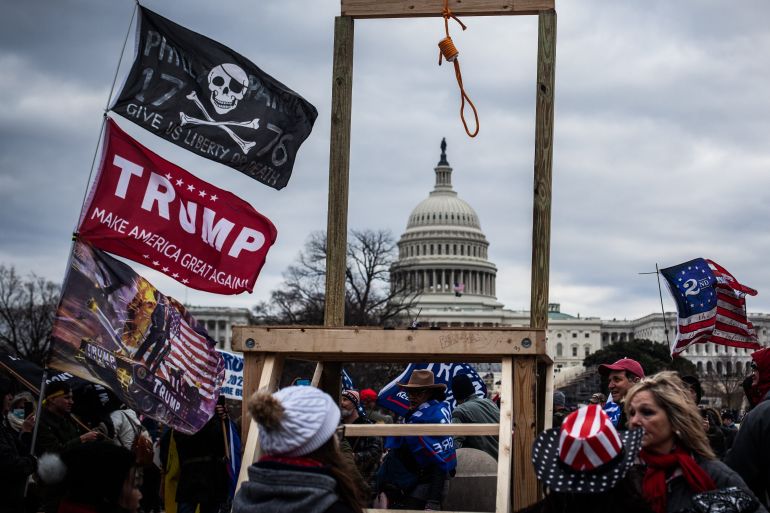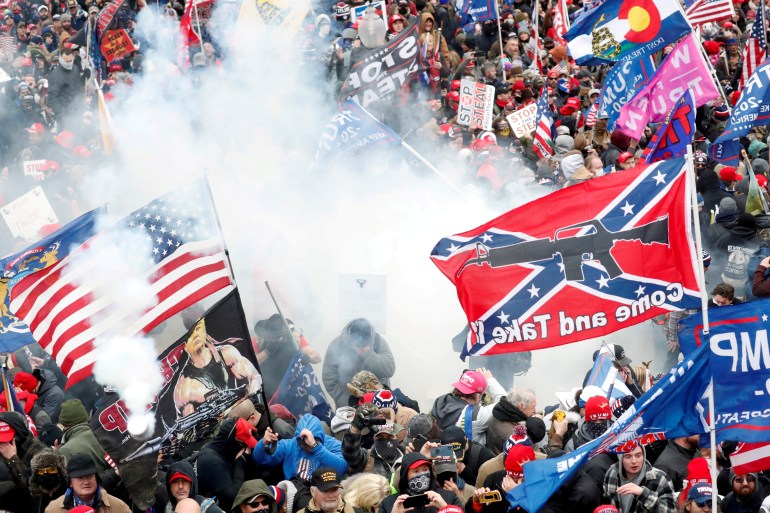Trump’s impeachment trial raises unique legal questions
What are the legal issues in Trump’s second impeachment trial? Can a former president be impeached?

As the United States Senate opens its second impeachment trial of former President Donald Trump, senators will grapple with thorny political and legal questions, top constitutional lawyers tell Al Jazeera.
“An impeachment and a Senate trial are a unique constitutional procedure that is entirely in the control of the House and Senate,” said Jan Baran, a US Supreme Court practitioner at Holtzman Vogel Josefiak and Torchinsky in Washington.
Keep reading
list of 3 itemsUS Senate sets speedy timeline for Trump impeachment trial
Who’s who in Donald Trump’s second impeachment trial
“Whether they do the right thing by impeaching or by convicting is ultimately within the judgement of the American public and the voters,” Baran told Al Jazeera.
The US Constitution gives Congress the sole power to impeach and remove a president and bar them from holding future office for committing “treason, high crimes and misdemeanors”. The courts have almost no say in how Congress proceeds.
In an impeachment, the House of Representatives acts like a grand jury and appoints managers to prosecute the charge. The Senate conducts the trial with individual senators acting as jurors and providing a forum for presentation of evidence and arguments.
A two-thirds majority of the Senate is required to convict, a very high bar that has never been met for a president in US history.
What has Trump been charged with?
Former President Trump was impeached by the House of Representatives on a charge of “incitement of insurrection” after the US Capitol was invaded by his political supporters on January 6.
Trump had hosted a rally of supporters near the White House on the same day Congress was meeting to certify Joe Biden’s election victory. In a fiery speech, Trump had urged them to march on the Capitol.
The House article of impeachment charges that Trump gave a speech in which he “reiterated false claims” he had won the 2020 presidential election and urged the crowd to “fight like hell”.
The crowd “breached and vandalized the Capitol”, killing a police officer and injuring many more, and “menaced” members of Congress.
The article alleges Trump’s prior conduct included “efforts to subvert and obstruct the certification of the results of the 2020 presidential election”.
As such, the former president “threatened the integrity of the democratic system, interfered with the peaceful transition of power and imperiled a coequal branch of government”, the House said.

What has been the response of Trump’s defence lawyers?
Trump’s lawyers are insisting he did not incite a riot at the US Capitol last month and argue that his impeachment by the House should be dismissed by the Senate.
In a pre-trial brief filed on February 8, Trump’s legal team, Bruce Castor and David Schoen, offered a robust response to House Democrats’ charges that the former president is guilty of “incitement of insurrection”.
Trump’s lawyers argue that in addition to his remarks being protected by the US Constitution’s First Amendment, which guarantees the freedom of speech, “not a single word encouraged violence or lawlessness, explicitly or implicitly”.
In the brief filed on Monday, the lawyers offered a litany of evidence to bolster the arguments they filed last week in response to the House Democrats’ article of impeachment, prosecuting Trump with “incitement”.
Is it unconstitutional to impeach a former president?
Although it has never been done before, the consensus among legal experts is the House and Senate have authority to impeach a former US official, including a former president.
More than 170 constitutional law scholars signed an open letter last month concluding the Constitution permits the impeachment, and potential conviction and disqualification of Trump from holding future office.
“The impeachment is clearly constitutional,” said Douglas Laycock, a professor of law at the University of Virginia and signatory to the letter.
“Presidents do not have a free opening to … try to overthrow the newly elected government at the end of their term, or commit any other high crime or misdemeanour just because there is no longer time to complete a trial in the Senate,” Laycock told Al Jazeera.

Did Trump’s speech incite the crowd to violence?
The House managers will argue to the Senate that Trump appeared before a tense crowd, “whipped them into a frenzy” and “aimed them straight at the Capitol”.
Trump’s lawyers can be expected to argue that the former president did not intend the people in the crowd do anything other than demonstrate peacefully outside the building with signs and slogans.
“The test of incitement in the criminal courts is very forgiving of speech that walks right up to the line of incitement because we have in mind these people are kooks and there is always time to crack down on them,” said Michael Dorf, professor of law at Cornell Law School.
“And we want to be very careful about cracking down on them simply because they are espousing hated ideas like anarchy, communism or white supremacy,” Dorf told Al Jazeera.
The definition of what counts as incitement in an impeachment trial, however, is much broader, Dorf said. “The protections applicable in a criminal case do not apply. There is certainly enough to satisfy the standard in an impeachment trial.”
Was Trump’s speech protected by the First Amendment?
The US Constitution’s First Amendment prohibits Congress from making any law restricting free speech, the press, assembly and religion.
House managers have argued First Amendment principles do not apply in an impeachment proceeding and do not shield Trump from consequences for provocation of an assault on the Capitol.
“There is a much broader issue about, at what point do demonstrations, organisation of demonstrations and speeches to demonstrators get protected by First Amendment rights versus being held accountable for physical damage and harm to individuals in the aftermath of the demonstration,” Baran said.
“Those are tough issues and in recent history, certainly in the last 100 years, our judiciary has been very careful not to turn words and speeches into crimes,” he said.